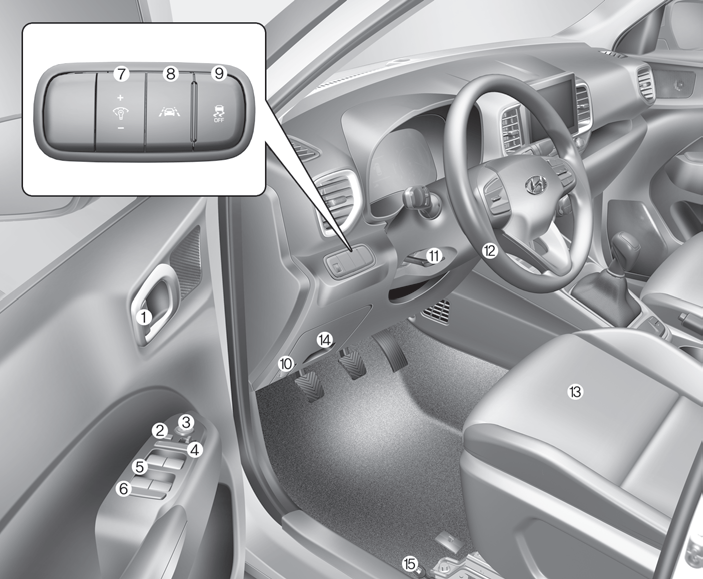Hyundai Venue: Convenient Features / Steering Wheel
Electric Power Steering (EPS)
The system assists you with steering the vehicle. If the vehicle is turned off or if the power steering system becomes inoperative, you may still steer the vehicle, but it will require increased steering effort.
Also, the steering effort becomes heavier as the vehicle’s speed increases and becomes lighter as the vehicle’s speed decreases for better control of the steering wheel.
Should you notice any change in the effort required to steer during normal vehicle operation, have the system checked by an authorized HYUNDAI dealer.
CAUTION
- If the Electric Power Steering System does not operate normally, the
warning light (
 ) will illuminate
on the instrument cluster. You may steer the vehicle, but it will require increased
steering efforts. Take your vehicle to an authorized HYUNDAI dealer and have
the system checked as soon as possible.
) will illuminate
on the instrument cluster. You may steer the vehicle, but it will require increased
steering efforts. Take your vehicle to an authorized HYUNDAI dealer and have
the system checked as soon as possible. - When an abnormality is detected in the electric power steering system, to prevent a an accident, the steering assist function may become inoperative. At this time, the warning light turns on or blinks on the cluster. The steering wheel may become difficult to control or operate. Have your vehicle checked immediately, after moving the vehicle to a safe area.
Information
The following symptoms may occur during normal vehicle operation:
- The steering effort may be high immediately after placing the ignition switch in the ON position. This happens as the system performs the EPS system diagnostics. When the diagnostics are completed, the steering wheel effort will return to its normal condition.
- A click noise may be heard from the EPS relay after the ignition switch is in the ON or LOCK/OFF position.
- Motor noise may be heard when the vehicle is at a stop or at a low driving speed.
- When you operate the steering wheel in low temperatures, abnormal noise may occur. If the temperature rises, the noise will disappear. This is a normal condition.
- When an error is detected from the EPS, the steering effort assist function may become inoperative in order to prevent fatal accidents. Instrument cluster warning lights may be on or the steering effort may be high. If these symptoms occur, drive the vehicle to a safe area as soon as it is safe to do so. Have the system checked by an authorized HYUNDAI dealer as soon as possible.
Tilt Steering / Telescope Steering
When adjusting the steering wheel to a comfortable position, adjust the steering wheel so that it points toward your chest, not toward your face. Make sure you can see the instrument cluster warning lights and gauges. After locking the lever, push the steering wheel both up and down to be certain it is locked in position. Always adjust the position of the steering wheel before driving.
WARNING
NEVER adjust the steering wheel while driving. This may cause loss of vehicle control resulting in an accident.

To adjust the steering wheel angle and height:
1. Pull down the lock-release lever (1).
2. Adjust the steering wheel to the desired angle (2) and distance forward/back (3).
3. Pull up the lock-release lever to lock the steering wheel in place.
Information
Sometimes the lock release lever may not engage completely. This may occur when the gears of the locking mechanism do not completely mesh. If this occurs, pull down on the lockrelease lever, readjust the steering wheel again, and then pull back up on the release lever to lock the steering wheel in place.
CAUTION
While adjusting the steering wheel height, please do not push or pull it hard since the fixture can be damaged.
Horn

To sound the horn, press the area indicated by the horn symbol on your steering wheel (see illustration). The horn will operate only when this area is pressed.
NOTICE
Do not strike the horn severely to operate it, or hit it with your fist. Do not press on the horn with a sharp-pointed object.
 Theft-Alarm System
Theft-Alarm System
This system helps to protect your vehicle and valuables. The horn will sound
and the hazard warning lights will blink continuously if any of the following occur:
-- A door is opened without using the remote key or smart key...
 Mirrors
Mirrors
Inside Rearview Mirror
Before driving your vehicle, check to see that your inside rearview mirror is
properly positioned. Adjust the rearview mirror so that the view through the rear
window is properly centered...
Other information:
Hyundai Venue (QX) (2020-2025) Service Manual: Overdrive Clutch Control Solenoid Valve (OD/C_VFS). Description and operation
Description • Overdrive clutch control solenoid valve(OD/C_VFS) is attached to the valve body. • This variable force solenoid valve directly controls the hydraulic pressure inside the overdrive clutch...
Hyundai Venue (QX) (2020-2025) Owners Manual: LCD Display Modes
Shift to P to edit settings This warning message appears if you try to adjust the User Settings while driving. For your safety, change the User Settings after parking the vehicle, applying the parking brake and moving the shift lever to P (Park)...
Categories
- Manuals Home
- 1st Generation Venue Owners Manual
- 1st Generation Venue Service Manual
- Smart Key
- Type B, C
- Warning and Indicator Lights
- New on site
- Most important about car
Interior Overview

1. Door lock/unlock button
2. Outside rearview mirror control switch
3. Central door lock switch
4. Power window switches
5. Power window lock switch
